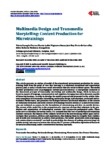Use este identificador para citar ou linkar para este item:
http://www.alice.cnptia.embrapa.br/alice/handle/doc/1035570Registro completo de metadados
| Campo DC | Valor | Idioma |
|---|---|---|
| dc.contributor.author | TORRES, T. Z. | pt_BR |
| dc.contributor.author | SOUZA, M. I. F. | pt_BR |
| dc.contributor.author | CARVALHO, J. R. P. de | pt_BR |
| dc.contributor.author | EVANGELISTA, S. R. M. | pt_BR |
| dc.date.accessioned | 2016-01-29T11:11:11Z | pt_BR |
| dc.date.available | 2016-01-29T11:11:11Z | pt_BR |
| dc.date.created | 2016-01-29 | pt_BR |
| dc.date.issued | 2015 | pt_BR |
| dc.identifier.citation | Creative Education, v. 6, p. 2466-2480, Dec. 2015. | pt_BR |
| dc.identifier.uri | http://www.alice.cnptia.embrapa.br/alice/handle/doc/1035570 | pt_BR |
| dc.description | This article presents an outline of model of the educational microcontent production for microtraining, built from the point of view that learning is a relational, intentional and experiential process, and, as such, it results from social interactions that also occur in labour spaces. The model, entitled "production cycle of pedagogical contents (microcontents)" is conceptually anchored in the theoretical precepts of transmedia storytelling and multimedia design, which in turn, are based in aspects of language, communication and cognition, bringing innovative elements capable of favouring leanings. In order to develop the model proposed and presented in the article, inherent conceptions to transmedia storytelling, multimedia design and education, are bound and articulated. Furthermore, one promotes the dialogue between non-formal education in the context of continuous formation and in the interest of technology transfer actions (TT) and of rural extension and technical assistance, for the formulation of microtraining activities via mobile devices. The essence of the model lies in the proposition of a sequence of steps that culminate in the production and organization of technological contents that incorporate pedagogical paths. Those paths serve as learnings favouring routes. It is accepted that this way of producing and organizing contents increases the chances of the subjects involved in the microtraining reflect upon and investigate their practices, abilities and experiences, thus helping them to resignify their realities and to build new rationalities to address their problems. The model "production cycle of pedagogical contents (microcontents)" was built to potentialize the chances of making microtrainings via mobile devices into massive actions that favour the TT process of Brazilian Agricultural Research Corporation (Embrapa), under a constructivist learning approach. | pt_BR |
| dc.language.iso | eng | eng |
| dc.rights | openAccess | eng |
| dc.subject | Multimedia Design | pt_BR |
| dc.subject | Multimídia | pt_BR |
| dc.subject | Tecnologia digital | pt_BR |
| dc.subject | Ferramenta pedagógica | pt_BR |
| dc.subject | Gestão da informação | pt_BR |
| dc.subject | Educação não formal | pt_BR |
| dc.subject | Microconteúdo | pt_BR |
| dc.subject | Microcontent | pt_BR |
| dc.subject | New techonology | pt_BR |
| dc.title | Multimedia design and transmedia storytelling: content production for microtrainings. | pt_BR |
| dc.type | Artigo de periódico | pt_BR |
| dc.date.updated | 2016-02-19T11:11:11Z | pt_BR |
| dc.subject.thesagro | Tecnologia da informação | pt_BR |
| dc.subject.thesagro | Adoção de inovações | pt_BR |
| dc.subject.nalthesaurus | Innovation adoption | pt_BR |
| dc.subject.nalthesaurus | Education | pt_BR |
| dc.subject.nalthesaurus | Information technology | pt_BR |
| riaa.ainfo.id | 1035570 | pt_BR |
| riaa.ainfo.lastupdate | 2016-02-19 | pt_BR |
| dc.contributor.institution | TÉRCIA ZAVAGLIA TORRES, CNPTIA; MARCIA IZABEL FUGISAWA SOUZA, CNPTIA; JOSÉ RUY PORTO DE CARVALHO, CNPTIA; SILVIO ROBERTO MEDEIROS EVANGELISTA, CNPTIA. | pt_BR |
| Aparece nas coleções: | Artigo em periódico indexado (CNPTIA)  | |
Arquivos associados a este item:
| Arquivo | Descrição | Tamanho | Formato | |
|---|---|---|---|---|
| multimedia.pdf | 478,63 kB | Adobe PDF |  Visualizar/Abrir |









